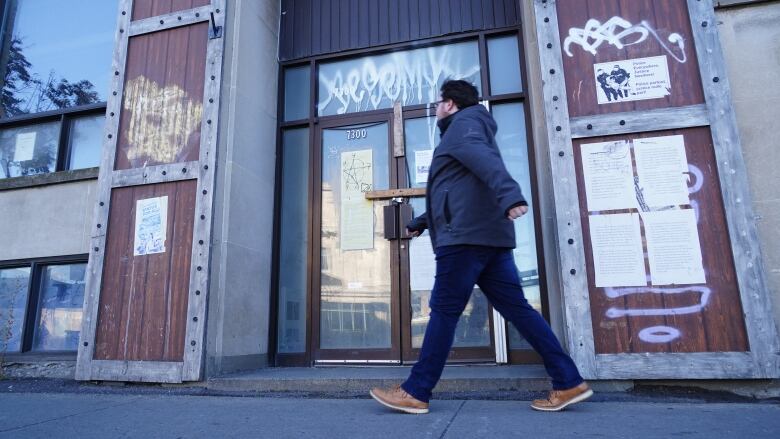This building is still locked shut, a year after Montreal paid $6.5M to turn it into social housing
Delay in renovating space in Parc-Extension a symptom of larger failures at provincial level, advocates say

In September 2020, the city of Montreal took the unusual step of forking over $6.5 million to buy back a sought-after property from developers in the city's Parc-Extension neighbourhood to turn into social housing.
But more than a year later, community groupsworking to develop the building known as the Johnny Brown building or Plaza Hutchison say they haven't seen any forward movement.
The building's door has beenlocked shut and its inside hollowed out, in preparation for renovations that haven't started.
Community groups in the area known as Park Ex say the city's current system is inadequate to provide housing for all those that need it.
"In Parc-Extension alone we have around 700 people on the waiting list for social housing. So even with the plaza and the Acadie site, it's not enough," said Celia Dehouche, spokesperson from Comit d'Action de Parc-Extension.
Across from Montreal's Parc Metro station, Plaza Hutchison used to be a bustling community centre with family-owned shops, prayer spaces, an immigrant aid centre and even a local radio station.
In 2017, the building was bought out by real estate developer BSRGroup to build luxury apartments. After all tenants were evicted, residents pushed back, saying the condos would price them out of their neighbourhood.

The city's move aimed to avoid that. But without funding from AccsLogis, the province's social housing program, the project is at a standstill.
Plaza Hutchison isn't the only building waiting to be revived. Areportby the social housing commission says 1,800 units have been under construction for more than four years.
In Montreal, there are about 24,000 people waiting for social housing, and the average development time for housing projects is four and a half years.
Why the wait is so long
In August, the federal government announced it would investnearly $338 million (at least $46 million of which must go to Montreal) to support the development of 1,300 new affordable housing units in Quebec over the next year.
The Coalition Avenir Qubec government has also put money into AccsLogis to finish units promised by the previous Liberal government, but hasn't put any money into developing new projects like Plaza Hutchison.
In a statement, Bndicte Trottier-Lavoie, a spokesperson for the province's housing minister,Andre Laforest, said out of the 15,000 units promised by the Liberals, 7,000 have been built and as many are still being developed.
Last Friday, Laforest announced $250 million toward renovating and creating social housing units through AccsLogis and Logements Abordables Qubec. In Montreal, 307 projects are eligible for funding through the program falling short ofthe thousands of units left to build.
Experts and critics are left wondering how the city will follow through on itspromises of 12,000 units of affordable and social housing.
Valrie Plante, running for a second term, recently promised 60,000 more units over the next decade. Candidates Denis Coderre and Balarama Holness promised 50,000 and 30,000 units respectively.
Hlne Blanger, professor of urban studies and tourism at the Universit du Qubec Montral, said such promises are not realistic if the province and federal government don't devote more money to housing.

As a result, Blanger said, the city finds itself in a "bizarre situation of being able to invest, but [it]doesn't have enough money to finish the projects."
The longer projects take to finish, the more expensive they become as construction costs and the price of land go up over the years, creating another hurdle, experts say.
The city owns several buildings that could be developed into social housing, like the abandoned Chinese hospital in Villeray, but because they aren't included in the 15,000 units promised by the previous administration, the funding is nowhere to be found.
"The problem is we start these projects, then the prices go up, and it takes so long that we see the projects won't get done because now it's too expensive," said Andrs Fontcilla, a Qubec Solidaire MNA and the party's housing critic.
"So, the faster we complete these projects, they become more financially viable. It's necessary to finance them immediately."
Can private developers fill the gap?
With long delays in social housing, experts say protection around the private rental market is crucial.
It seems to me that this is a loophole that should be much tighter, precisely to force landlords to build social or affordable housing.- Andrs Fontcilla
Community groups have long been pushing for a public rental registry to minimize excessive rent hikes and bans on temporary rentals, for example. Blanger pointed to zoning laws and tight protocols for renovations to prevent landlords from evicting tenants to renovate and rent the unit at a higher price.
"If we don't protect what is existing, that is still affordable, that puts pressure on the social housing structure. If people cannot afford to live in private rental housing, they will need social housing. So everything is linked," she said.
Blanger also pointed to Montreal's new housing bylaw, which requires developers to make a percentage of newly built units affordable or else facefines.
Though experts and community groups are mostly in favour of the changes, many say it remains too easy for developers to get out of the affordable unit requirements.
"It seems to me that this is a loophole that should be much tighter, precisely to force landlords to build social or affordable housing," said Fontecilla.
Alternative funding is possible
Absent more funding, some experts say the city should consider ways of financing housing projects that don't rely on government programs, like the para-municipal Socit d'habitation et de dveloppement de Montral.
Founded in the 1980s, the SHDM's initial mission was to acquire buildings, renovate, and either give them to non-profit organizations or lease them.

Though itsactivities have changed, the agency stillowns a few thousand units in the city and hasa portfolio of $622 million, funded through itsown activities.
"They could use this asset to finance other acquisitions without having to always wait for the Quebec government to fund, because funding from the Quebec government is really necessary but we know right now that it's not guaranteed,"said Louis Gaudreau, a professor at UQAM's school of social work who has researched the housing crisis.
Community groups say they are left feeling discouraged by the stalling, which is a big reason housing protests target Legault's government.
Dehouche of the Comit d'Action de Parc-Extension says if only the city had approved development plans for Plaza Hutchison and allocated "at least half of the money to start the project, maybe it would have been ready next year."












_(720p).jpg)


 OFFICIAL HD MUSIC VIDEO.jpg)
.jpg)



























































































